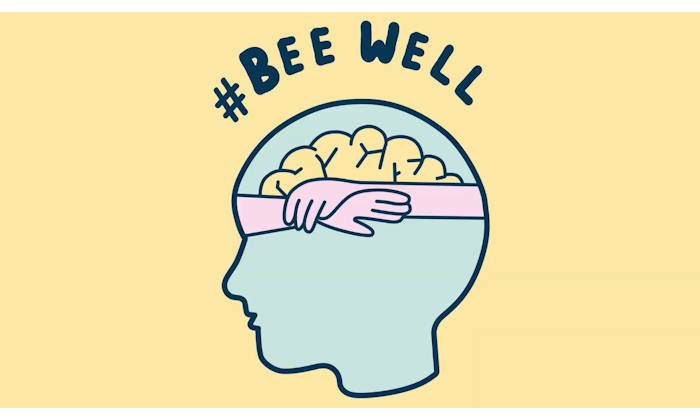Youth-led #BeeWell uncovers insights into young people’s experiences
23 Mar 2022
Greater Manchester’s #BeeWell programme, which focuses on young people’s wellbeing, carried out the biggest survey of its kind in the country in Autumn 2021

- #BeeWell survey of young people’s wellbeing receives almost 40,000 responses from across Greater Manchester
- Survey co-designed with young people to reflect their needs and aspirations
- 4 in 5 young people say they feel they belong at school, with around two thirds involved in sport outside of school at least once a week
- Gaps reported in wellbeing scores between girls and boys, while young people identifying as LGBTQ+ reporting higher levels of stress and emotional difficulties
- Responses will be used to inform new social prescribing pilot in Greater Manchester, with youth-led funding pots of £20,000 to support health and wellbeing activities
Young people across Greater Manchester have places to spend their free time and feel they belong at their school, according to the results of a survey. More than 160 schools took part in the initiative in its first year, in an enormous region-wide push to support young people’s wellbeing – led by young people themselves.
Young people co-designed the #BeeWell survey, launched it in schools, and have worked with researchers to identify key findings and priority areas of research. The survey received just short of 40,000 responses, representing approximately 60% of all young people in Year 8 and Year 10 in the city region.
Key findings
University analysis has found:
- Wellbeing metrics for Greater Manchester young people seem consistent with what we know from other large studies nationally, from life satisfaction to mental wellbeing to emotional difficulties.
- There are noteworthy gaps in wellbeing scores between males and females, with girls reporting lower wellbeing than boys. There are also sizeable inequalities for young people who identify as LGBTQ+, who on average report higher levels of stress and emotional difficulties.
- The majority of young people say they have things to do and places to go. 73% reported they can almost always/often do what they like in their free time, and 70% agreed/strongly agreed that they have places to go to spend free time in their local area. 4 in 5 young people also feel that they belong at their school.
- Physical activity levels appear to have fallen following the pandemic, with only 1 in 3 young people reaching the recommended levels of physical activity set by the Government’s Chief Medical Officer.
- Despite this, a large majority of young people (67%) are still getting involved in sport outside of school at least once a week, and 4 in 5 young people feel they have good, very good or excellent physical health.
- This World Sleep Day, the #BeeWell study can also reveal that 40% of young people say they do not normally get enough sleep to feel awake and concentrate on schoolwork during the day. The average time spent on social media per day is 4.4 hours a day.
These findings are already informing activity across Greater Manchester, with schools, voluntary sector organisations and children’s services working closely with young people to interpret and act on the results. This includes a new social prescribing pilot in five neighbourhoods in response to the #BeeWell data. Young people in participating neighbourhoods will have access to £20,000 commissioning pots to spend on mental health and wellbeing activities in their local area.
Professor Neil Humphrey, academic lead for #BeeWell, said: “The young people of Greater Manchester have spoken. The crucial next step is for the system to respond to what they have told us with the kinds of support that young people want and need, supported by professionals and their local communities. This is just the start of the research we will be able to carry out with the dataset and we will work closely with young people and partners to maximise its impact.”
Councillor Eamonn O’Brien, portfolio lead for young people in Greater Manchester, said: “There are brilliant strengths emerging throughout the city region that are a testament to our schools and our communities. There are also clear opportunities to act together, with young people leading the way, to improve our support for their mental health and wellbeing.”
Mayor of Greater Manchester Andy Burnham said: “If we want young people in Greater Manchester to get on and succeed, it’s vital that we listen to them about what they want from the support and opportunities that are out there. The idea behind #BeeWell – the biggest survey of its kind in the country – was to work with young people to create something that would give us a genuine insight into how they experience life growing up in our city-region.
“Clearly, though, this survey has uncovered things that need to be addressed. Young people were hit hard during the pandemic, which exposed the deep inequalities that still exist in our communities. What’s important now is that, working with our partners across Greater Manchester, we use these findings to make sure that our young people get the support they need to thrive.”
Janice Allen, Headteacher at Falinge Park High School, said: “This is a moment to recognise that schools have been there for children throughout the pandemic and will continue to be there. It is immensely difficult in schools at the moment as we start to see the impact of COVID-19, but through #BeeWell we can make sure that mental health and wellbeing are at the forefront of what we do. The challenge is to now seize this opportunity together.”
